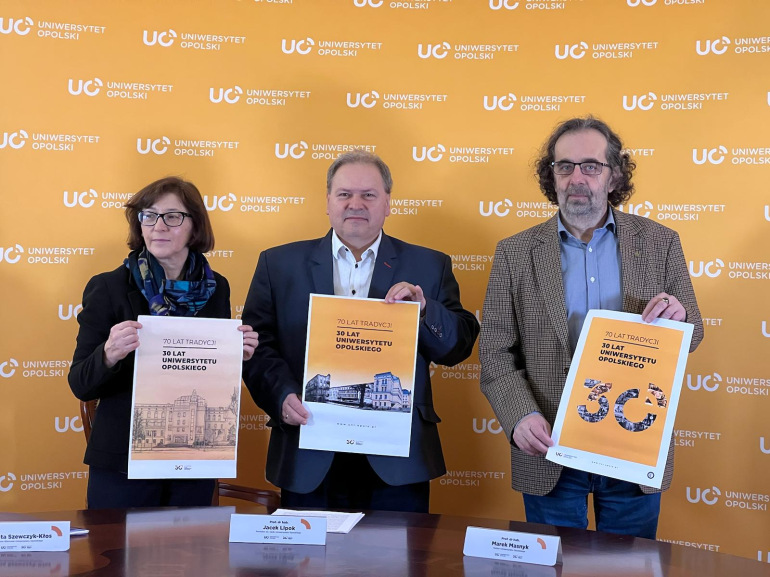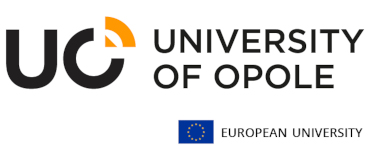30 years of UO

The University of Opole, the largest higher education institution in the region, has begun its 30th anniversary celebrations. “We are entering the fourth decade with considerable success, we have passed a difficult exam exceptionally well," says the UO Rector. “This success would not have been possible without the outstanding scientific activity of our employees, the joint effort of all those employed at our university and the entire academic community, as well as the support of regional and national authorities.”
The University of Opole was established at the 14th session of the Polish Sejm of the second term, when the Act of 10 March 1994 on the establishment of the university was passed. It was then the twelfth university in Poland. The UO was formed through the merger of two institutions of higher education in Opole: the Higher School of Education (1954-1994), one of the best pedagogical universities in Poland, and the Opole Branch of the Catholic University of Lublin, existing since 1981, based on several decades of experience of the Higher Theological Seminary in Nysa (where the academic staff of the former Faculty of Theology of the Jan Kazimierz University in Lviv worked). The UO opened its doors on 1 October 1994 with four faculties.
Today, the UO has 12 faculties, 17 institutes and approximately
80 study programmes. In recent years, more than 9,000 students (including
almost a thousand foreign students) have studied here every year. In the latest
evaluation conducted by the Ministry of Education and Science for 2017-2021, an
assessment of the quality of scientific activity, the UO received one A+ grade,
six A grades and ten B+ grades. “This means that in each of the evaluated
disciplines, we have full promotion rights, i.e. we can conduct proceedings for
granting doctoral and post-doctoral degrees. It also gives us full educational
autonomy, i.e. we can make our own decisions about study programmes we want to
offer to young people,” says Prof. Jacek Lipok, Vice-Rector for Science.
The UO has been a member of the European University Network since 2019 and, as
of 2024, of the EUA (European University Association), a highly valued
organisation of higher education institutions from across Europe, which is one
of the European Commission's main partners in the area of dialogue with
academic communities in Europe. The University of Opole is also part of
the FORTHEM alliance together with Johannes Gutenberg Universität Mainz
(Germany), Université de Bourgogne (France), Jyväskylän yliopisto (Finland),
Università degli Studi di Palermo (Italy), Latvijas Universitāte (Latvia),
Universitat de València (Spain), Universitetet i Agder
(Norway) and Universitatea 'Lucian Blaga' din Sibiu (Romania). We are
also in the Erasmus+ programme, under which we have signed agreements with 241
universities from 27 European Union countries. In addition, we have bilateral
agreements with 28 universities from 27 other countries around the world. Even
such distant ones as Australia, the USA, Brazil, Cambodia, Indonesia, Vietnam,
Kazakhstan or Mexico. Under the Europa Master programme it is also possible to
obtain diplomas from foreign universities. Graduates receive diplomas from the
UO, the University of Dijon (France) and the University of Mainz (Germany). The
first students were admitted in the academic year 2013-2014. “Today, we can be
proud of the 130 graduates of these studies from 25 countries around the world
- many European ones, but also Mexico, the United States, Canada, Tunisia and
Morocco," says Prof. Jacek Lipok.
The past years, especially the last few, have also been a time of a huge leap
for the University of Opole in the highly valued ranking of the
"Perspektywy" Educational Foundation. In 2023, the University of
Opole was ranked 7th among universities and 24th among higher education
institutions in the country In 2022, we were ranked 9th among universities and
30th among HEIs in this ranking; in 2020, we were ranked 11th among
universities and 38th among HEIs; and in 2016, we were ranked 15th among
universities and in the sixth ten (places 50-60) of HEIs.
In addition to 9,000 students, the UO academic community also comprises nearly
2,000 employees, including more than 1,000 academics affiliated with the UO
under various forms of employment.
Another extremely important part of our community is formed by eminent
representatives of the world of culture, art, science or politics, who in
recent years have been awarded honorary doctorates from the University of Opole
and the Higher School of Education (HSE). Over the three decades of the UO's
history, these titles have been conferred on 48 extraordinary personalities, and
in the last few years of the activity of the HSE, three doctorates were
awarded. Among them were Pope John Paul II, Władysław Bartoszewski, Adam
Hanuszkiewicz, Lech Wałęsa, Ryszard Kaczorowski, Wojciech Kilar, Kazimierz
Kutz, Stanisław Lem, Archbishop Alfons Nossol, Jan Miodek, Hans Gert Pötering,
Tadeusz Różewicz and Dorota Simonides.
For the UO, the passing three decades have not only been a time of building a
scientific base, establishing international relations and strengthening its
position in the world of science and in public awareness. It was also a time of
major investments in infrastructure. The year 2000 saw the opening of the new
building of the Collegium Pedagogicum, and 2002 saw the opening of the
Collegium Maius, which today is the main building of the university. A year
later, the refurbishment of Collegium Minus, the seat of the UO administration,
was completed. In 2004, the Niechcic Hall of Residence was opened and in 2007 -
Collegium Civitas. The new seat of the Faculty of Law and Administration, i.e.
Collegium Iuridicum was opened in 2010 and in 2011 - the Student Culture
Centre. The refurbishment of the Collegium Artium, the building of the Faculty
of Art today, was finished in 2013.
Recent years have seen two further huge investments: in 2023, the UO's International Research and Development Centre for Agriculture and Agri-Food Industry opened, and in 2017, the Collegium Medicum, where medical students have been trained since then.
“The establishment of the medical programme at our university was clearly a bull's eye," says Prof. Marek Masnyk. “And the challenge was enormous. It required a lot of work and commitment not only on our part, but also on the part of the whole community of Opole and the Opole Voivodeship. It is true that Minister Jarosław Gowin provided funds for the construction of the facility, but a large portion of the money that ultimately made it possible to launch the medical school came from the voivodeship government and mayors from our region, as well as from the business community of Opole and even from local residents - in a word, from the entire community. There was enormous mobilisation, huge expectations, but also enormous social pressure. Today we are proud, we feel a great sense of satisfaction and we are delighted that we have succeeded.”
The efforts to establish a medical school at the UO began in 2015. A year later, the Ministry of Science gave its approval. In 2019, the Faculty of Medicine was established, and a year later the State Medical School in Opole was incorporated into the structure of the University of Opole and the twelfth faculty of our university was established on its basis: the Faculty of Health Science The first 78 graduates of the UO's medical school - the first graduating year to complete a full cycle of training at the UO - received their diplomas of graduation on 28 October 2023.
The past three decades have also not been short of dramatic events for our university. The most difficult one took place in 1997, when a flood wave during the so-called 'flood of the millennium' inundated the storerooms of the UO Main Library. 120 thousand books and journals were destroyed. Villa Academica and the building at 4 Wandy Street, which was the headquarters of the Department of Crop Protection of the then Agrobiochemistry, were also flooded.
UO in figures:
12 faculties, 17 institutes, almost 80
study programmes
110,735 graduates between 1994 and
2023, including 92,865 full-time and
part-time graduates, 17,440
postgraduates and 430 graduates of
doctoral programmes
1,065 academic teachers, almost 9,000 students with 10 percent of foreign students
241 partners (universities, partner
institutions) within the Erasmus+ programmes and 75 partners with whom we have signed cooperation agreements
51 honorary doctorates.
Rectors of the UO
1995-1996: prof. dr hab. Franciszek Antoni Marek
1996-2002: prof. dr hab. Stanisław Sławomir Nicieja
2002-2005: prof. dr hab. Józef Musielok
2005-2008: prof. dr hab. Stanisław Sławomir Nicieja
2008-2012: prof. dr hab. Krystyna Czaja
2012-2016: prof. dr hab. Stanisław Sławomir Nicieja
2016-present: prof. dr hab. Marek Masnyk
More about the UO:

